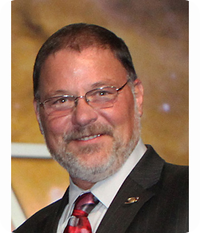The View From Here
The End of an Era
Written by: developer
 Friday, July 8, is scheduled to be the final Space Shuttle launch. It is the end of an era.
Friday, July 8, is scheduled to be the final Space Shuttle launch. It is the end of an era.
It is not the end of the world.
I’ll be the first to say that I am not happy that the United States is going into a “blackout” period whereby we will not be able to launch our own astronauts into space. But, I also think it’s important to keep what’s happening in perspective.
While it is true that the ultimate explorer is the human being, most of what goes on in space today does not involve — nor require — human passengers. In fact, in the entire space age thus far, fewer than 600 people have escaped our atmosphere, while hundreds of thousands of people earn a living through space endeavors every year.
Most space activity is commercial — some of it relatively routine at this point. It’s the satellites that manage communications, provide television and radio programming, collect weather data, support military operations, facilitate logistics, provide metrics and tracking and just help make everyday life work. More than 50 nations have some sort of satellite assets and I fully expect both volume of assets and the number of nations to continue to grow.
In addition, most space exploration is unmanned — consisting of probes, space telescopes, robots and rovers. A wide array of extraordinary technological devices deliver news of mind-boggling discoveries every day. Look at your newspaper (or the news clips the Space Foundation posts daily) and you’ll find a steady stream of “routine” announcements — each of which would have been “News of the Year” stuff back when I was a kid. Just a few weeks ago, two such items caught my eye on the same day: an extraordinary photo of a black hole gobbling a star and emitting a never-before-observed gamma ray pulse and the discovery of water ice on the planet Mercury.
Based on this tiny slice of time, I submit that the rumors of the death of the U.S. “space program” may be just a tad exaggerated. There are hundreds of programs — government and commercial, foreign and domestic — that are moving forward, producing results and preparing us for the next level of exploration and advancement.
We are moving into a new era where more organizations, more nations and more people are involved in the business of space. Opportunity is growing to learn more, to see more and to accomplish more. So, let’s keep some perspective on what’s ending here: a successful, long-term space program that taught us so, so much about science, about space flight and — unfortunately — about politics.
Because, while I am optimistic that space exploration and development will continue in the U.S. (and in many a growing list of nations), I also recognize that this country could be doing more and we could be doing it better and faster, if we could get our act together on how we develop and sustain policy and how we build, approve and deliver budgets. We need solid direction so that commercial businesses will feel comfortable investing their resources to develop the next generation of spacecraft — with a goal of once again carrying U.S. astronauts on U.S. vehicles. And, we need a solid commitment so that we can continue to encourage other nations to collaborate peacefully on space research, exploration and commerce.
The U.S. has always prided itself on its space leadership. And, let’s face it, the ability — shared by so few — to put a human being into space has been a huge component of that leadership. We know that much of what initially inspires and motivates young people to study science and to pursue careers in space is the idea that “one day, I, too, may get to go there.” And, we know there’s nothing that can get the heart thumping with pride more than watching a magnificent rocket hurtle into space.
In the end, the impact of the final Space Shuttle launch is emotional. We’re losing — albeit temporarily — a key component of our leadership position. We’re saying good-bye to something that, to many, epitomizes the American persona. (Is it just a coincidence that the “Welcome to America” video shown in passport control zones in many American airports features a Space Shuttle launch?)
It’s sad. But, it’s not fatal. And, let’s remind ourselves that the global space business is growing and thriving. Every single day, new discoveries are being made and we are learning new ways to benefit from space.
To the Space Shuttle program, we say thank you for a job well done.
To this final mission, we say Godspeed.
To all who feel as passionately about space as we do, we quote Sir Winston Churchill: “Now this is not the end. It is not even the beginning of the end. But it is, perhaps, the end of the beginning.”
This article is part of Space Watch: July 2011 (Volume: 10, Issue: 7).
